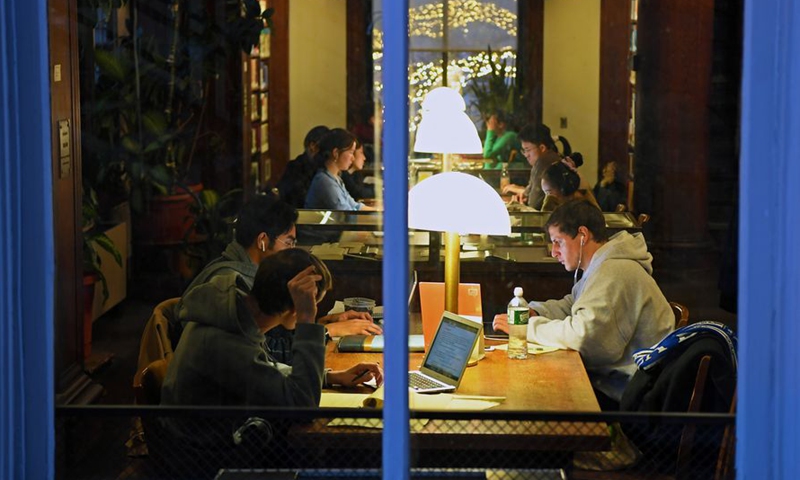
Students study at a library of Columbia University in New York, the United States, on Dec. 7, 2019.Photo:Xinhua
The US embassy and consulates in China are scheduled to open visa appointments for Chinese students on May 4, after Washington announced easing of travel restrictions for foreign students.
The move is positive but no sign of improvement for China-US people-to-people exchange, Chinese analysts say, as visa restrictions for Chinese STEM students remain effective.
William Bistransky, acting consul general at the US Embassy in China, announced the visa re-opening for Chinese students during a Friday press conference. Mr. Bristransky said the embassy will gear up visa processing for those students once appointments officially re-opened, but certain details, such as anti-pandemic measures for those students and whether local vaccinations received by Chinese students will be recognized by the US, remain unknown.
His remarks were made after the Biden administration announced on Tuesday that it was easing restrictions for Chinese and other students traveling to the US this fall.
Chinese students accounted for 35 percent of international students in the US in the 2019-20 school year, according to the International Education Exchange (IEE), nearly twice as many as the second-highest, being students from India.
However, Chinese students' willingness to study in the US has been gradually waning, after the two countries locked into a series of competitions, including trade and technology disputes, and the former US administration continuously imposed restrictive visa policies for Chinese students with certain backgrounds.
The Trump administration launched a "China Initiative" to investigate economic espionage, which limited visas for Chinese STEM students.
When answering whether there's any follow-up policy to eliminate these restrictions, Bristransky said that "the vast majority [of STEM students] do receive their visas and travel to the United States." He also admitted that the US government has to do additional administrative processing on students with high-tech backgrounds, as well as some other technologies.
In May 2020, the White House issued a proclamation barring Chinese graduate students and researchers from studying or working in the US if they had previously been affiliated with China's military-civil fusion strategy as part of an effort to restrict China's access to US technologies. The acting consul general said, "that does remain in effect."
Bistransky said the re-opening of visa appointments sends a signal to Chinese students that Americans "welcome foreign students into our homes or communities or universities."
The fact that all those previous restrictive visa policies remain in effect shows that the US' re-opening of visa appointments does not prioritize improving people-to-people exchanges between the two countries, Li Haidong, professor at the Institute of International Relations of the China Foreign Affairs University, told the Global Times.
Li said that the US is not ready to forego the policy of "securitizing" educational ties between China and the US. "So it's fair to say that the US decision to open doors for Chinese students simply bows to pressure from domestic education institutions, who are out of pocket now."
The American Council on Education had pressed the administration of President Joe Biden to act quickly, saying in a letter last month it could "deliver a welcoming message to current and prospective international students, which can help restore the US as a destination of choice, as well as supporting an important economic activity as the US economy recovers from the COVID-19 pandemic," Reuters reported.
Yet Li also hailed the US' readiness to let in Chinese students as a "positive signal," as it will stimulate mutual understanding to a certain extent. "But the US should not get their hopes too high that once the door is opened, there's going to be an influx of Chinese students coming in. Given the still ravaging COVID-19 situation in the US and a rising Asian hate problem, there might be a decline [of Chinese students entries] compared with previous years," said the expert.
He also urged American universities to adopt protective measures to guarantee Chinese students' safety, under the circumstances.
Cheng, a student from the University of Chicago, who has been taking online classes in China, said that although the policy is being relaxed, she still prefers to stay in China and take classes remotely.
"There are still a lot of unfavorable situations in the US. The pandemic is not under control, and there are some hate crimes against Asians. Even with direct flights, I would not choose to attend classes on campus in the US," she told the Global Times previously.
Last year, a white paper co-issued by one of China's biggest private education services, New Oriental Education, shows that the UK has overtaken the US and become Chinese students' favorite destination for studying abroad. Chinese student enrollment in US universities started to decline even before the pandemic. In 2019, Chinese enrollments in the US dropped roughly 1% compared with the year before—officially ending a decade of growth. Enrollments declined 2.5% in 2020.




